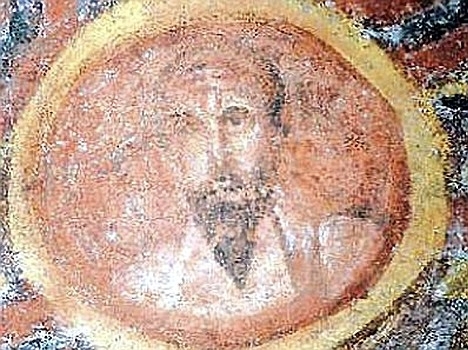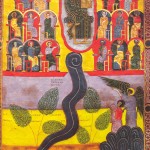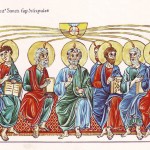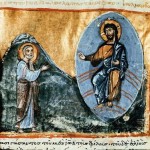
What It’s About: Here we have the story of an enslaved person, a young girl, who encountered Paul and Silas. She had a “spirit of divination,” which made her especially valuable for her owners, who profited by letting out her services to those who wanted to know the future. This was a common thing in antiquity, of course; slaves were exploited for their labor, and those with special skills like literacy, trade skills, or divination were especially valuable. This story is about what happened when the girl saw Paul and Silas, and the spirit recognized that they were servants of God. Eventually Paul drove the spirit out, which angered her owners. The rest of the story involves Paul and Silas’ persecution and punishment, and their miraculous release from prison–although they don’t actually leave the prison until invited to do so. The whole episode serves to underscore the power of Paul and Silas, and the power of the God they served.
What It’s Really About: Paul always seemed to be getting into trouble for one reason or another. Here, he causes economic trouble (compare to the story of the Ephesian silversmiths in Acts 19), and when people’s bottom lines get impacted, they get anxious. It’s interesting, how the author of Acts has tied opposition to Paul to economic self-interest; people resist Paul and his message because they want to protect their own places in the power structures. At the end of this story, one of the key structures of the systemic power–the prison–is destroyed, allowing Paul and Silas to go free. Furthermore, the jailer and his family were convinced too.
What It’s Not About: It’s interesting how much the writer of Acts is at pains to show how Paul and Silas didn’t run away. They were happy prisoners, singing hymns to the other inmates. And then an earthquake broke the foundation of the prison…but they didn’t leave. Only when the jailer invited them to leave did they depart; they were law-abiding and authority-respecting to the end. This is a kind of theme for Paul’s ministry; he was always getting himself into trouble, but it was usually for things that he didn’t deserve to be in trouble for, and he always seemed to wiggle out of them.
Maybe You Should Think About: This could be a really interesting text to preach in relation to liberation. The enslaved person was liberated from a spirit of divination, which is a spiritual event. But in so doing, she was liberated (in some ways, not in others) from the exploitation she experienced at the hands of those who enslaved her. So her spiritual life and her economic life were tied together, in intimate ways that might point to our own lives. How much of the liberation that the world needs, and that we need as persons, is part of our economic lives? How much are we bound by our “value” to the world–the degree to which we can be exploited for our skills? What would liberation from that look like?
Revelation 22:12-14, 16-17, 20-21
What It’s About: I often tell my students that Revelation isn’t at the end of the bible because it’s about the end of time, necessarily. Its place there has as much to do with its place in the canon and its position in discussions through the years as it does with eschatology. But chapter 22 of Revelation is as good a benedictory chapter for the bible as any. It’s a lovely, hopeful chapter…the kind of section that, if they made the bible into a movie, would be shot at sunset with a gauzy filter and soaring music. This part of Revelation is all about the resolution to all the drama and struggle of the rest of the book, and it’s about the peace that John sees coming at the denouement of the cosmic struggle.
What It’s Really About: Imagine John, sitting on the island of Patmos, a prison colony off the coast of Asia Minor, writing his apocalypse. He was probably animated by fear, anger, hope, piety, revelations from God, and an abiding sense of needing to comfort others. The bulk of the apocalypse provides that kind of comfort in many ways, some of which quite terrifying. There are calamities and catastrophes, and the cosmos is undone bit by bit. All of that was probably meant to be comforting to his fellow Christians; in the end, he was saying, God will win out. And here at the end, comfort comes in a different way: in a scene of restful triumph, where all is well and all is right. I have to imagine that John sighed and smiled as he wrote this chapter, feeling that he had accomplished what he wanted to accomplish.
What It’s Not About: I always get nervous when the lectionary skips around, because I want to see what it is leaving out. Here it skips verses 15, 18, and 19. What’s in those verses? As it turns out, verse 15 is all about the outsiders: those who do not get to be part of the benedictory goodness that this passage is describing. Dogs, sorcerers, fornicators, idolaters, murders, and general practitioners of falsehood are all excluded. Verses 19 and 19 are a little less harsh, but also pretty dire: they are a warning to those who would alter the text. So basically the lectionary is having us skip all the scary parts, where God is not being warm and fuzzy, but instead mean and vindictive.
Maybe You Should Think About: I’ve maintained that Revelation 21 and 22 are perfect texts for preaching about creation, environmentalism, climate change, Earth Day, and the like. This is perhaps another good example. What is the vision of the end (both in the sense of a finish and in the sense of a telos) here? What has all of this been for? Does this chapter help us to think about the arc of salvation history? Of terrestrial history?
What It’s About: If the Revelation reading above was benedictory, then so is this passage from John. Here, Jesus is looking forward, in almost-wistful kinds of ways, to the future of his disciples, but also of others who are yet to come. What Jesus wants for those people–his followers present and future–is unity. “That they may all be one.” The meaning and nature of that oneness is left a little bit vague, but we can get the sense. Jesus wants his followers to be unified. This has, of course, in no way been the case. In John, there is no Lord’s Prayer, and there is no prayer in the Garden of Gethsemane, so this prayer functions as Jesus’ main and final prayer. There are elements of the Lord’s Prayer here, in verses 11, 15, and 17, but overall the form and content of this prayer are distinct to John.
What It’s Really About: This passage comes just before Jesus’ arrest and death, and it foreshadows some of that material. In John, the gospel “hinges” at several points–in chapter 4 with the story of the Samaritan woman, in 11 with the death and raising of Lazarus, and here as Jesus turns toward the cross and a post-earthly-Jesus movement. It’s interesting, given the possible composition of the “community of the beloved disciple” (as Raymond Brown put it), that unity would be one of Jesus’ big wishes as he faced his own death. Was being “one” a challenge for that community? Could Jesus tell that it would be an ongoing problem? It’s hard to know for sure, but whatever the reason for it appearing here, it’s clear that Christians have not done a very good job of it.
What It’s Not About: It’s not really about oneness of opinion, is it? What makes Jesus and God “one,” and what might make humans “one,” is “glory,” love, and knowledge. Glory of the kind shared by Jesus and God, and the love of God, and the knowledge of God’s name, are the foundations for unity. Jesus pointedly doesn’t suggest that unity will come through unanimity of doctrine; it will come through sharing in God through Jesus. That’s a really interesting thing to think about.
Maybe You Should Think About: If one-ness comes through glory, love, and knowledge, and if one-ness was what Jesus prayed for, how then do we seek it? How do we come to possess this unity that Jesus wanted? Is that a job for individuals? For governments? For the church? For God? For another day?












